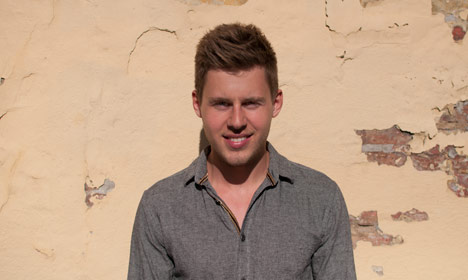With Screenmailer, you can share ideas with your peers, co-workers or friends by recording your screen, uploading the screencasts to a safe server and sharing it with anyone.
The Local sat down with the programme’s founder, Jonas Bruun Nielsen, a former Nordic Startup Awards Developer Hero.
How did you come up with this business idea?
Screenmailer was built out of my own need. I worked with long-distance clients and colleagues for years and consistently used screen recordings as a more clear and personal way of giving feedback, instructions and demos. Why? Well, most people use email to send letters and Skype for live meetings and screen sharing. What I needed was a combination. Something that was fast and asynchronous like email but with the same clear and personal communication that screen sharing offers.
Today, Screenmailer offers exactly that. Just click to start a recording of your voice and screen. When you're done recording, Screenmailer immediately provides a link that you can use to share your video. And here's the magic: Because the app processes and uploads your video while you're recording, even a 40-minute video is ready for your recipient to stream online in just a few seconds.
What were the initial challenges? How did you overcome them?
Screenmailer's main challenges, initially, were to solve the technological challenge of being able to record a high-quality video and share it immediately online. We wanted the app to support better communication with full screen video recording but in a way that also offered the speed of email. That meant recording a five-minute video and waiting another five minutes for the video to process and upload before you could share. It wasn't good enough.
After months of development, I managed to solve the puzzle. In our latest benchmark, Screenmailer was 8,000 percent faster than our biggest competitor. Screenmailer does not waste a single heart beat.
How has the journey been so far?
After releasing Screenmailer in January 2014, the feedback from the market was very positive. We got backed by Start-Up Chile, the biggest startup accelerator in the world, in the spring of 2014. Since then we've worked hard on improving the service and are happy to soon be able to release a major upgrade of Screenmailer as well as a Windows version.
Like other services that offer something new, there's a big challenge in getting the word out. But we are growing every month and enjoy the positive feedback we keep getting.
How has becoming an entrepreneur changed you, personally?
I've always been an independent person who enjoyed responsibility and challenges. But my experiences in the past few years have taught me a lot of valuable lessons. One of the biggest challenges people face when they set out to build a company is an overwhelming sense of uncertainty. Most of the time, it's unclear whether your company is winning or failing.
Personally, the consequence can be that you go through stressful periods where you don't know whether you can pay salaries. Maybe you will have to fire people. Perhaps your landlord will kick you out. And what if you get a lawsuit? I have had many experiences I couldn't predict: Selling every item I owned to move to Chile, a country where I couldn't speak the language, sleeping under the desk, losing major deals, driving sports cars and celebrating victories. The sum of those experiences have given me a calm strength that can take a lot.
It's gratifying to know that you can handle uncertainty and adapt in ways that most people can't.
Any other personal reflections and/ or message to budding entrepreneurs?
Go for it. Be methodical and execute every day. A prototype is worth a thousand meetings. Focus on sales. Money is the lifeblood of a business and the only true metric for success is profits.
Entrepreneurs tend to praise themselves when things are going well and blame everyone and everything else when the company is failing. The truth is, there's a major element of luck involved. So tell yourself that there's no such thing as failing, only feedback. Maybe you will win and maybe you won't. But if you learn every step of the way and keep trying, the world will reward you in ways you couldn't even predict.
 Sparsh Sharma holds a Master's in business administration and a Bachelor's in electrical engineering. After having worked in top Indian media companies, he came to Denmark in the fall of 2012 to study at Aarhus University and later worked at Lego. A Danish green card holder, he is currently looking for marketing or consulting opportunities globally, while working as a freelance journalist for The Local Denmark and blogging about his experiences in Denmark. You can follow him on Twitter at @sparsh_s.
Sparsh Sharma holds a Master's in business administration and a Bachelor's in electrical engineering. After having worked in top Indian media companies, he came to Denmark in the fall of 2012 to study at Aarhus University and later worked at Lego. A Danish green card holder, he is currently looking for marketing or consulting opportunities globally, while working as a freelance journalist for The Local Denmark and blogging about his experiences in Denmark. You can follow him on Twitter at @sparsh_s.


 Please whitelist us to continue reading.
Please whitelist us to continue reading.
Member comments